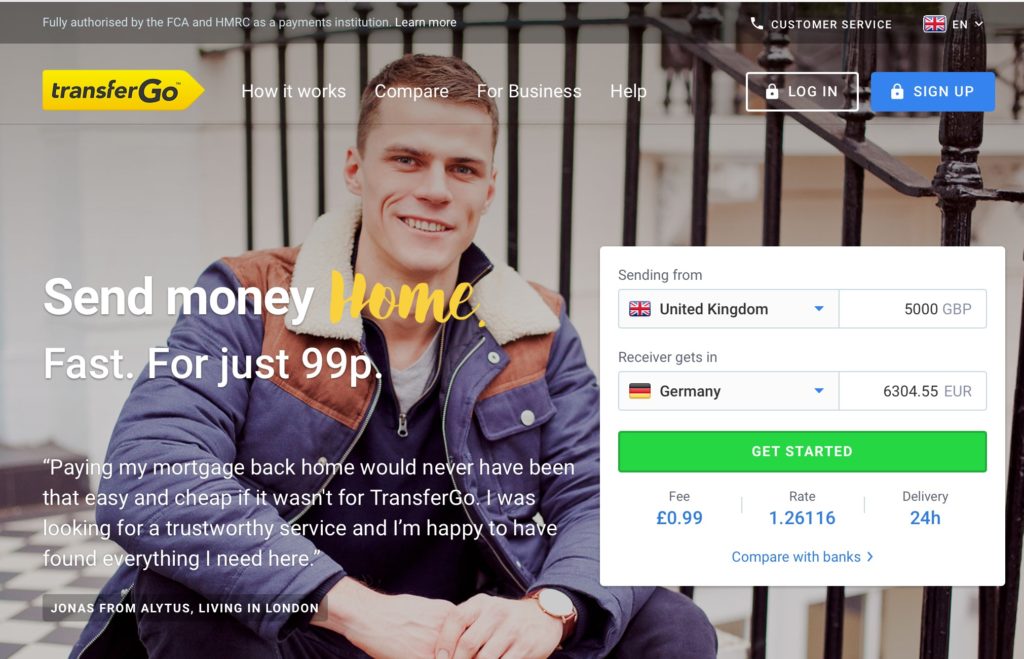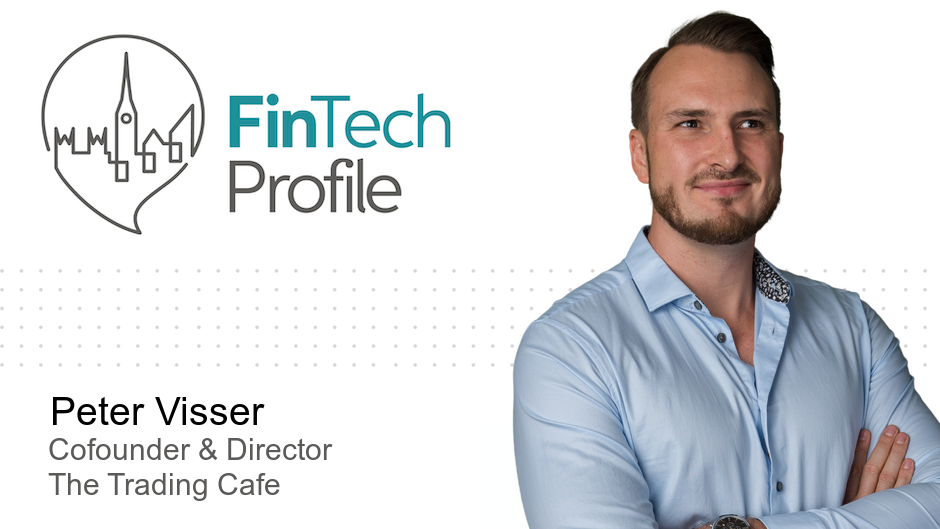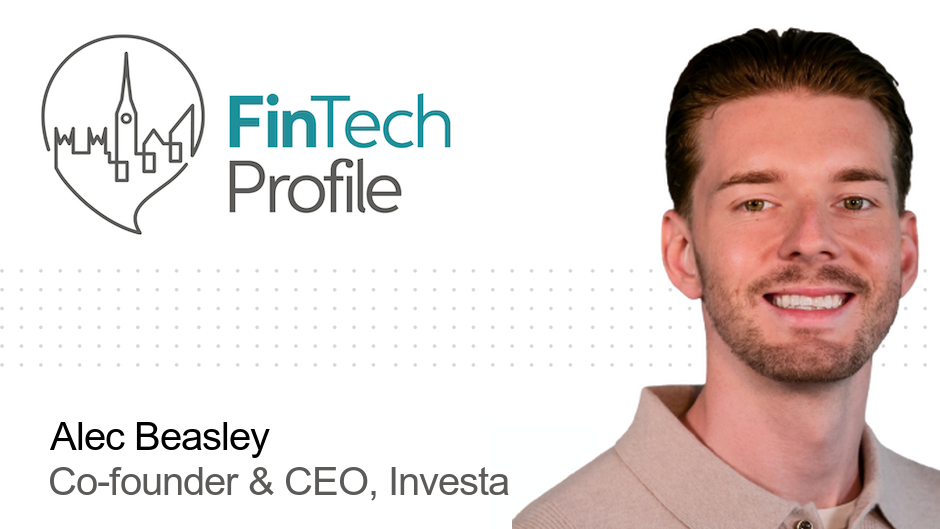Daumantas Dvilinskas of TransferGo

Today we have Daumantas Dvilinskas from TransferGo.
TransferGo is a high-growth pure-digital international money transfer service. The company uses a digital account-to-account business model. Funds are paid in locally and then paid out locally, from any account to any account. The sender make a local payment to TransferGo, which then makes a local payment to the recipient. This innovative system means that we don’t have to send money across borders. Due to the scale and efficiency of our business model, we are able to offer superior pricing: we are up to 95% cheaper than traditional players.
Our questions are in bold.
– – – – –
Who are you and what’s your background?
I am Daumantas Dvilinskas – a serial entrepreneur, currently holding the position of CEO @ TransferGo. Previously I co-founded Pinevio.com and “Green Trends”, of which I was also CEO. I graduated in Business Studies from Lancaster in 2010, as I was always business-oriented and focused on creating something new, to add value to society. As one of the co-founders of TransferGo, I am finally fulfilling my dream, not only of leading a successful business, but also of making a real difference and helping people to enter a middle-class lifestyle. It’s why fintech is so fascinating to me.

In my spare time, which admittedly is something of a luxury, I am also a startup advisor and mentor for many of my peers. In 2014, I was recognised in the 30 under 30 list of young business leaders by the Nordic Business Report, and this year I had the honour of being part of the Innovate Finance delegation at the World Economic Forum. That was an amazing opportunity to meet world class experts in the field and to network with the greatest minds out there. This year was quite special, too, because, probably for the first time, fast-growing innovative fintech startups were invited to join in the conversation (historically it’s been reserved for the big names only). It indicates a major shift in how the worlds’ leaders view fintech startups and their importance.
What is your job title and what are your general responsibilities?
I’m the CEO of TransferGo, which means I have to manage, strategise and oversee the business from all possible angles. I believe a very important part of my job is hiring people. The makeup of any team has a significant impact on the success of the business, and I have to make sure that everyone is a good cultural fit, even with 6 different nationalities on board. Also every member has to be aligned with our mission and visions, so they can work autonomously, making their own decisions towards contributing to the company’s goals. As a CEO, I have to make sure all this is in place, so I can go and hunt for more investment and/or partnerships.
Can you give us an overview of your business?
Our settlement model is very different from the competition’s. While competitors either apply the p2p model or deal with cash, we apply the local-in, local-out model, which allows us to pay money out to recipients as soon as we receive the funds from the senders. We work with banks rather than against them, giving TransferGo a significant advantage over competitors. We’ve already built up more than 30 partnerships around the world with mainstream banks. This huge network of bank partners and bank accounts allows us to facilitate payout funds and ensure that transfers are made quickly, safely and at the lowest costs.
Second, we manage currency fluctuations via our clever backend system, meaning that our clients aren’t exposed to currency fluctuation risk, whereas others usually ask the client to deposit an extra 3% FX deposit to cover any possible currency fluctuations. As currencies fluctuate daily this FX deposit can be quite a steep fee if you are unlucky. We’re therefore not only consistently faster than the competition but, if you take the total cost of any transaction, we are also cheaper and more predictable.
Finally, we have fully localised product experience including web and mobile products as well as customer care, making us accessible to more clientele out there who prefer to be offered services in their local language.
Tell us how you are funded.
We received our first investment at an extremely early stage. Despite it being fairly small, it was much-needed encouragement and proof that the problem we’re solving is important to many people. To receive the record-breaking seed-round investment that we landed last December took us quite a bit of time and effort, mainly because you have to choose your investors wisely. It’s not only the money that you’re after, but also the advice, expertise and mentorship that is sometimes a crucial aspect of the decision-making process. You have to evaluate how the investment and people involved will be helping your company grow, and to actually care about that.
We’ve secured a 2.5million USD record breaking seed round investment in December in 2015.
The round was led by Mark Ransford, former investor at Apax Partners; Voria Fattahi, former investor at Kinnevik; Clive Kahn, former Travelex CEO; and Richard Tudor, former partner at Exponent.
Why did you start the company? To solve what problems?
TransferGo was born out of frustration while dealing with banks and trying to make international money transfers via them. In 2011 my co-founder and I established a more traditional import/export business, which meant we had to make regular international payments to our suppliers. Back then, banks were our only option and, oh boy, it was a nightmare. Needless to say, we were charged up to 15 times more than now for 7-day settlements. We faced an unfair and stagnated money transfer sector – with an unreliable destination amount, huge charges and the transaction time stretching up to 7 working days. There was, however, a general sense that customer satisfaction wasn’t really something major UK banks paid a great deal of attention to. Once we saw the problem, we immediately realised that a solution such as TransferGo could help many people like us.

Who are your target customers? What’s your revenue model?
TransferGo’s target audience is migrant workers from the CEE region, who make regular payments back home for various reasons ranging from family support and saving to paying off loans and suppliers (if it’s a business).
The main goal and vision of TransferGo is helping migrant families to save the money they earn. It’s important to realise that the average transfer (size cannot be disclosed) sometimes amounts to 20% of the monthly income at the recipient end. This money has a huge impact on the quality of life for those families, even helping them to enter a middle-class lifestyle, and we’re very proud to be a part of this transformational impact.
In comparison with the main competitors (incumbents, banks, WU) we can save up to 90% on the transfer cost. Additionally, because of the speed of the service, we enable same-day purchasing power on the recipient end, which adds to the previously mentioned transformational impact.
Even without a huge marketing focus, it did not take long for companies that do business in multinational locations to take note of the ease of TransferGo’s services and to incorporate them into their business plan.
As the COO of Zenitech, a full-stack development agency that has been using TransferGo for more than half a year now, says, “TransferGo is a very easy and quick way to send money. Sometimes, we have very critical payments to make and TransferGo helps us to receive money on time.”
CEO of London-based wine merchant Humble Grape James Dawson, after we asked for some feedback on his experience with us, had only positive things to say: “It’s just a no brainer… After using it once, I have never considered going back to the bank. Now everyone in my company knows TransferGo and uses it for business as well as for their personal needs.”
If you had a magic wand, what one thing would you change in the banking and/or FinTech sector?
I believe it’s what small FinTech businesses are already doing – switching from the equivalent of mass production to niche propositions tailored to the consumer. I wish all the necessary regulations were there to smooth the process. The UK is very advanced in this area and we’re happy to hear about the FCA’s Sandbox project, which hopefully will open their eyes to further progress in the area.
Magic is still needed though in changing people’s habits and building trust. There is still a significant number of people who could use a bank but choose not to because of old habits or a previous negative experience of losing money while dealing with a bank. It would be great if these people had never been exposed to such atrocities. Obviously reaching those without bank accounts could be an another amazing magic trick, which hopefully could also help all the communities in the most rural areas of the world and create value for the end users or help them in times of crisis, such as the current refugee situation.
What is your message for the larger players in the Finance industry?
We at TransferGo have a mission to remove friction from cross-border money movements and make them accessible for all. Tech start-ups across the world share similar missions and have the potential to improve people’s lives profoundly at probably the fastest pace. That’s why I think in the coming years we should expect to see tech innovation being granted more and more seats at the most important tables. A large bank should see us as an equal partner and healthy competition rather than an enemy or an unnecessary addition to the equation. TransferGo is already on the positive side of this conversation, since we have more than 30 bank partners with similar values and an attentive attitude to the consumers. Therefore, to the CIOs of the largest banks, I can just say, please join in.
What phone are you carrying and why?
An iPhone. It’s the UX that sucks you in and never lets you go. Also, looking back, I’ve always admired Steve Jobs’ capacity to disrupt industries not only through hardware innovation but also through the innovation of a business model. One example is the introduction of iTunes, which absolutely transformed how we consume music today. That’s why I am a fan of Apple in general and so far I have no complaints about my iPhone experience.
Where do you get your industry news from?
Increasingly, I love using the Quartz app – news delivered via messaging. It gives me a comprehensive overview of everything I need to know, then when I have time I can dive deeper into certain topics. I also read Forbes, Business Insider & CBInsights. I much prefer high-quality, top-tier journalism to gossip or empty drum beating.
Can you list 3 people you rate from the FinTech sector that we should be following on Twitter?
I don’t think I can qualify people according to Twitter. I follow many, but for various reasons. In general, I was lucky to meet great mentors at the beginning of my career. Here are a few that I’d like to mention: Jon Bradford (@jd), ex MD at TechStars London; Eric van der Kleij (@Ericvanderkleij), ex MD at Level39. These are a few of the great people who have helped us to grow immensely, among many more that I’ve been fortunate enough to meet during my career. I believe at least some of them are inspiration for young entrepreneurs like I was several years ago.
What’s the best FinTech product or service you’ve seen recently?
Stripe. It’s the most flawless and simple payment processor out there. The ease of implementation, not to mention focus on security and customers via excellent customer care are all you need from an exceptional fintech product.
Finally, let’s talk predictions. What trends do you think are going to define the next few years in the FinTech sector?
Only 4 or 5 years ago the banking industry was built on the premise that banks provide many services to many clients. If you went to the homepage of any bank you could send money or get a loan or a mortgage. I see a change in that: from offering many to many to offering one service to a very specific niche and really focusing on providing superior product experience in that niche. I can see the shift happening with niche providers going after very specific client needs and offering clients something they haven’t been offered before. This transition is going to bring us from building monopolies to building great products. Because that’s what consumers will demand, and in more of a one-to-one environment. My vision is that there’s going to be a lot of value for the consumer out of finance and fintech going forward because of this change.
– – – – –
Thanks to Daumantas for his answers today. You can find out more about TransferGo on their website, twitter, Facebook and LinkedIn.
If you would like to receive email updates whenever we publish, sign up to our Newsletter. You can unsubscribe at any time and we will never use your email for anything else.
If you’ve any suggestions for hot FinTech companies (startup, or established ventures) that we should be profiling, or have an opinion piece to offer, or a FinTech related event you’d like to tell us about, have a look here for more details.





